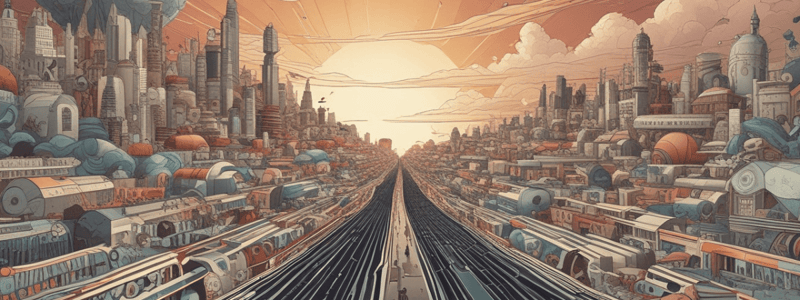Podcast
Questions and Answers
What is the primary focus of the Just Third Way paradigm?
What is the primary focus of the Just Third Way paradigm?
- The human person and their development (correct)
- The state and its role in society
- The collective good and the common wealth
- The market and its regulation
What is the Just Third Way, in the context of scientific communities?
What is the Just Third Way, in the context of scientific communities?
- A set of rigid laws and principles
- A rigid ideology with no room for change
- A framework of assumptions, thinking, and methodology (correct)
- A fixed set of rules and regulations
What is the primary distinction between a natural person and an artificial person in the Just Third Way?
What is the primary distinction between a natural person and an artificial person in the Just Third Way?
- Citizenship and nationality
- Biological and corporate existence
- Age and experience
- Inherent human nature and dignity (correct)
What is the fundamental principle underlying the Just Third Way's approach to human development?
What is the fundamental principle underlying the Just Third Way's approach to human development?
What is the relationship between the Just Third Way and individualism and collectivism?
What is the relationship between the Just Third Way and individualism and collectivism?
What is the primary goal of the social environment in the Just Third Way?
What is the primary goal of the social environment in the Just Third Way?
What is the significance of the concept of person in the Just Third Way?
What is the significance of the concept of person in the Just Third Way?
What is the relationship between the Just Third Way and Thomas Kuhn's idea of scientific revolutions?
What is the relationship between the Just Third Way and Thomas Kuhn's idea of scientific revolutions?
What is the primary distinction between the Just Third Way and other economic and social paradigms?
What is the primary distinction between the Just Third Way and other economic and social paradigms?
What is the primary characteristic of power?
What is the primary characteristic of power?
What is the underlying philosophy of the Just Third Way?
What is the underlying philosophy of the Just Third Way?
What is the main function of money in an economy?
What is the main function of money in an economy?
What is the core principle of Binary Economics?
What is the core principle of Binary Economics?
What is the primary goal of democratizing access to capital credit?
What is the primary goal of democratizing access to capital credit?
What is the primary characteristic of social justice?
What is the primary characteristic of social justice?
What is the primary role of internal controls in an economy?
What is the primary role of internal controls in an economy?
What is the primary goal of economic democracy?
What is the primary goal of economic democracy?
What is the primary role of the Employee Stock Ownership Plan (ESOP) and Consumer Stock Ownership Plan (CSOP) in economic democracy?
What is the primary role of the Employee Stock Ownership Plan (ESOP) and Consumer Stock Ownership Plan (CSOP) in economic democracy?
What is the primary goal of the Economic Democracy Act?
What is the primary goal of the Economic Democracy Act?
Why is it critical to spread the idea of economic democracy?
Why is it critical to spread the idea of economic democracy?
Flashcards are hidden until you start studying
Study Notes
Introduction to the Just Third Way
- The Just Third Way is a paradigm that differentiates itself from individualism (capitalism) and collectivism (socialism and communism)
- It focuses on the human person, recognizing the dignity and development of each person, and creating a social environment that supports the full development of each person
Understanding the Just Third Way
- The Just Third Way is a framework that contains basic assumptions, ways of thinking, and methodology that are commonly accepted by members of a scientific community (Thomas Kuhn's idea of scientific revolutions)
- It is a theory or group of ideas about how something should be done, made, or thought about
Key Concepts
- Person: a natural person with inherent human nature, dignity, and equal natural rights to all other human persons
- Artificial persons: corporations, e.g.
- Power: the capacity or ability to do something, act in a certain way, and direct or influence others to effect change
- Can be concentrated and lead to corruption and destruction
- Property: the right of control over what one owns, including possessing, excluding others, disposing, transferring, using, destroying, or injuring
- Includes the right to enjoy the fruits, profits, products, or increase from what one owns
- Limited and socially determined by laws and institutions
Money and Credit
- Money: a yardstick for measuring economic input, economic output, and the relative values of real goods and services
- Not a commodity, but a symbol of value
- A medium of exchange, anything that can be used to settle a debt
- Credit: a loan of money to be repaid, based on trust and promises
- Inextricably linked to money, but not a commodity
Binary Economics
- Theory: production equals income, and each person has the means to produce through their labor and/or capital ownership
- Se's Law: supply creates its own demand, and demand creates its own supply
- Binary Economics: the concept of balance and growth in the economy, where each person has the means to produce and earn income
Democratizing Access to Capital Credit
- Innovation: creating a system where non-owners can access capital credit to produce and earn income
- Repayment: through the future profits of the acquired capital
Systemic Approach to Economic Justice
- Justice: ensuring every person has access to institutions and principles of the Just Third Way
- Participative Justice: each person has the natural right to participate fully in the process of production and earn income from it
- Distributive Justice: dictates how much each person is entitled to based on their contributions and participation### Principle of Justice and Social Justice
- The principle of justice is based on the distribution of goods and services based on need.
- Social justice is concerned with the system being defective and harming people, and the need for corrective action.
Key Principles of Social Justice
- A free market economy is necessary for justice, but it is not sufficient on its own.
- The four pillars of social justice are:
- Expanded capital ownership: every human person has the means and access to become an owner of capital.
- Economic power must start in the hands of each human person, not the government or other entities.
- Private property is essential for freedom and includes a bundle of rights and powers over owned things.
- The free and open market system is essential for the production of goods and services and the legitimate distribution of rewards.
Importance of Internal Controls
- Proper internal controls can reduce the need for frequent regulations.
- A moral structure is necessary to ensure equal access to information and prevent coercion.
Capital Ownership and Economic Democracy
- Each person's capital ownership account is a key concept in economic democracy.
- The Employee Stock Ownership Plan (ESOP) and Consumer Stock Ownership Plan (CSOP) are examples of ownership structures.
- The World's First Citizens Land Development Cooperative is a law passed in Missouri that aims to promote democratic ownership of land and infrastructure.
Financing Growth and Economic Democracy
- The Economic Democracy Act can be used to finance growth in a green, sustainable, and environmentally sound way.
- The role of commercial and Cooperative Banks, Central Banks, and regional federal reserves is crucial in implementing economic democracy.
- Capital Credit Insurance can overcome the barrier of collateral for loans.
Importance of Spreading the Idea
- The time is critical for implementing economic democracy, and knowledgeable and articulate individuals are needed to spread the idea.
- Leaders must be surfaced to promote the idea to every person and to leaders.
Introduction to the Just Third Way
- Differentiates itself from individualism (capitalism) and collectivism (socialism and communism)
- Focuses on human person, recognizing dignity and development, and creating a social environment for full development
Key Concepts
- Person: natural person with inherent human nature, dignity, and equal natural rights
- Power: capacity to do something, act, and direct or influence others to effect change
- Can be concentrated, leading to corruption and destruction
- Property: right of control over what one owns, including possessing, excluding others, disposing, and using
- Limited and socially determined by laws and institutions
Money and Credit
- Money: yardstick for measuring economic input, output, and relative values of real goods and services
- Symbol of value, medium of exchange, and settlement of debts
- Credit: loan of money to be repaid, based on trust and promises
- Inextricably linked to money, but not a commodity
Binary Economics
- Theory: production equals income, and each person has means to produce through labor and/or capital ownership
- Se's Law: supply creates its own demand, and demand creates its own supply
- Binary Economics: concept of balance and growth, where each person has means to produce and earn income
Democratizing Access to Capital Credit
- Innovation: creating system where non-owners can access capital credit to produce and earn income
- Repayment: through future profits of acquired capital
Systemic Approach to Economic Justice
- Justice: ensuring every person has access to institutions and principles of Just Third Way
- Participative Justice: each person has natural right to participate fully in production and earn income
- Distributive Justice: dictates how much each person is entitled to based on contributions and participation
Principle of Justice and Social Justice
- Principle of Justice: distribution of goods and services based on need
- Social Justice: concerned with system being defective and harming people, needing corrective action
Key Principles of Social Justice
- Free market economy necessary for justice, but insufficient on its own
- Four Pillars: expanded capital ownership, economic power, private property, and free and open market system
Importance of Internal Controls
- Proper internal controls reduce need for frequent regulations
- Moral structure necessary for equal access to information and preventing coercion
Capital Ownership and Economic Democracy
- Each person's capital ownership account key concept in economic democracy
- Examples of ownership structures: ESOP, CSOP, and World's First Citizens Land Development Cooperative
Financing Growth and Economic Democracy
- Economic Democracy Act can finance growth in green, sustainable, and environmentally sound way
- Crucial roles of commercial and Cooperative Banks, Central Banks, and regional federal reserves
- Capital Credit Insurance can overcome barrier of collateral for loans
Importance of Spreading the Idea
- Critical time for implementing economic democracy, needing knowledgeable and articulate individuals
- Leaders must surface to promote idea to every person and leader
Studying That Suits You
Use AI to generate personalized quizzes and flashcards to suit your learning preferences.




